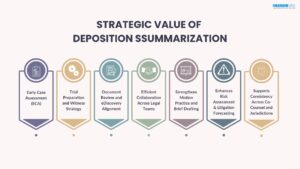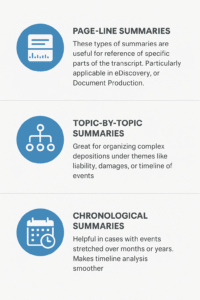
Courtrooms aren’t the only places legal battles are fought anymore. Increasingly, litigation occurs in documents, transcripts, and digital records long before a trial ever starts. In this way, deposition summarization is often overlooked as one of the best time- and cost-saving tools available to your team.
If you’re reviewing hours of testimony word-for-word, there’s a smarter way to work. Summarizing depositions isn’t about cutting corners; it’s about getting to the heart of the matter faster.
Let’s discuss why it matters, how it supports litigation strategy, and how outsourcing it can create a real impact for your law firm or legal department.
Strategic Value: More Than Just Time Savings
It’s fair to say deposition summaries cut down the amount of time that would be spent reviewing transcripts. However, there’s much more to the value of summaries than the hours saved; summaries contribute to the decision-making process throughout the lifecycle of litigation:

1. Early Case Assessment (ECA)
Summaries speed up the process of identifying themes, weaknesses, and areas for improvement. This enables partners and general counsel to make faster go/no-go decisions on strategy, whether it involves early settlement, motion practice, or trial preparation.
2. Trial Preparation and Witness Strategy
With chronological or issue-based deposition summaries, legal teams can isolate testimony across multiple witnesses on the same subject. This allows for thematic briefing, cross-examination preparation, and fact pattern consistency checks without rereading the source transcript.
3. Document Review and eDiscovery Alignment
Deposition summaries are an important layer in evidence mapping. By connecting each deponent’s testimony with the exhibits, production timeliness, and prior declarations, litigation teams can identify discrepancies or consistencies as they occur.
4. Efficient Collaboration Across Legal Teams
Whether you’re managing outside counsel, an in-house team across geographies, or working with legal process outsourcing (LPO) partners, summaries allow for uniform access to deposition content, reducing miscommunication, rework, and time wasted in back-and-forths.
5. Strengthens Motion Practice and Brief Drafting
Deposition summaries give litigators fast access to testimonial admissions, contradictions, and expert qualifications that are often central to dispositive motions. Whether it’s a motion to dismiss, a Daubert challenge, or summary judgment, the ability to extract and cite witness content precisely, without rereading entire transcripts, directly accelerates brief drafting and improves argumentative clarity.
6. Enhances Risk Assessment and Litigation Forecasting
Senior counsel and litigation managers need to quantify exposure as early as possible. There are structured summaries that help surface patterns, identify flags, and locate potential admissions which will enhance settlement value or may require compliance disclosures. In global litigation portfolios, they provide an additional layer of risk intelligence that improves the way legal ops communicates risk to business stakeholders or insurers.
7. Supports Consistency Across Co-Counsel and Jurisdictions
In multi-jurisdictional litigation or coordinated defenses, consistency in the story is everything. Summaries are the common factual foundation from which to build alignment of co-counsel, outside counsel, and internal legal teams. This helps avoid inconsistent legal arguments, and providing a common curated version of testimonial facts.
Also read: How To Get Effective and Reliable Deposition and Summarization Services!
Types of Deposition Summaries That Legal Teams Use
Not all summaries are created equal. The format you choose will depend on the audience and the use. Below are some common types:

A reliable deposition summarization service can deliver the format that best suits your case, while maintaining consistency across multiple depositions.
What High-Quality Deposition Summarization Looks Like
Not all summaries are created equal. At a strategic level, what separates a commodity service from a litigation asset is:
- Materiality filtering – Only the legally relevant and case-impacting content is captured.
- Fact-opinion distinction – The summary must clearly distinguish between factual testimony and subjective impressions.
- Issue tagging – Sophisticated summaries link testimony back to causes of action, defenses, or regulatory elements.
- Hyperlinked cross-referencing – Best-in-class summaries connect transcript excerpts with exhibits, prior testimony, or pleadings.
In essence, deposition summarization must behave like a structured knowledge layer sitting atop raw transcript data.
Deposition Summarization and Outsourcing: A Scalable Advantage
For legal departments and firms handling multiple jurisdictions or matters with dozens of deponents, internal bandwidth is a legitimate constraint. That’s why more litigation teams are turning to outsourced deposition summarization services, not for cost-cutting alone, but for scale, consistency, and expertise.
Here’s what top-tier outsourcing brings to the table:
1. Specialist-Grade Precision
LPO partners, like Aeren LPO, rely on trained legal professionals, typically with a JD or LLB, who have an understanding of case theory, procedures and sources of law and law relevance, but not just simply mechanical summarization, but rather, legal intelligence.
2. Volume Handling Without Quality Drop
Whether you’re running a multi-deponent class action or responding to a regulatory subpoena involving a global workforce, outsourcing lets you scale summary generation without hiring and training new staff.
3. TAT Flexibility for Litigation Timelines
Fast-moving cases demand fast-moving support. With on-demand deposition summarization, you control the turnaround, 24h, 48h, or longer, with SLA-backed delivery.
4. Cost Efficiency Without Compromising Strategy
Senior associates shouldn’t be reading full transcripts. Outsourcing this work frees up high-cost legal talent to do what they do best: draft, argue, and win. It also protects your margins in alternative fee arrangements (AFAs) or fixed-fee litigation models.
5. Improved Confidentiality and Data Security
Advanced LPO’s secure ISO-certified environments, VDI secure access, encrypted communications, and layered access to processes. Advanced LPO firms also ensure full compliance with GDPR, HIPAA, and mandate client confidentiality requirements.
Final Thought: Deposition Summaries Are Litigation Infrastructure
At the point when legal teams are asked to do more with less, deposition summary is one of the few true enablers. It connects the dots from witness testimony to actionable legal intelligence.
Whether you’re evaluating witness credibility, aligning discovery strategy, or briefing senior stakeholders, a good summary gets you there faster—with fewer errors, less friction, and better outcomes.
Ready to streamline your litigation workflows?
Partner with Aeren LPO for expert-level deposition summarization services tailored to the pace, complexity, and confidentiality needs of global legal teams.
Let us do the heavy lifting, so your lawyers can focus on what matters.

